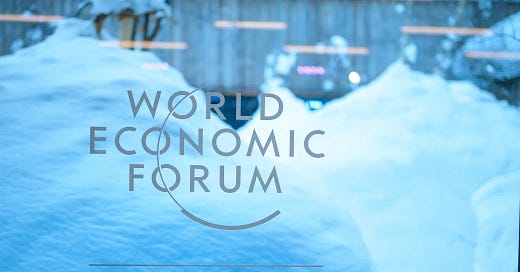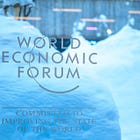'Davos Man' will soon be on that magic mountain
Repost: A swipe at the elite schmooze fest and the case for a kinder capitalism
Welcome to This Week, Those Books, your rundown on books new and old that resonate with the week’s big news story.
🎧 Would you rather listen? Click on the audio button above for a human, not AI, voiceover of the 2024 post on Davos by my close collaborator Michael.
🎉Rejoice…our community of nearly 10,500 subscribers is now in 120 countries🎉
Please consider supporting this news literacy effort so that we can keep it freely accessible. If you can’t pay for whatever reason, just email thisweekthosebooks@substack.com and we’ll give you full access, including to the archives, no questions asked.
– Rashmee
Programming note: We’re taking a break…to read 📚…and are doing slightly re-jigged reposts like this one. Back with new content on Jan 15.
The Big Story:
Soon enough, it will be Davos time 2025. The Swiss village hosts the global business and political elite every January at a schmooze fest formally called the World Economic Forum (WEF).
The Alpine hothouse has long served as a celebration of globalisation. But in 2025, just as in 2024, self-interested nationalism, anti-democratic factionalism and hot wars threaten to undo the march toward a liberal, borderless world economy.
The Backstory:
The WEF, a non-profit, was founded in 1971 by economist Klaus Schwab to promote global cooperation on political, social and economic issues.
In the years since, Davos has become shorthand for an uber-privileged talking shop of the world’s 1%. Famously, the only thing Donald Trump, Nelson Mandela, Bono and Greta Thunberg have in common is they’ve all been to Davos.
In 2004, political scientist Samuel Huntington identified a faithless, self-seeking species he called “Davos Man”.1 Routinely derided as rich and out of touch, some academics till recently argued2 Davos Man has become more inclusive.
In an earlier, more innocent time, Davos was known3 for little more than its rarefied mountain air and tuberculosis sanatorium and became the setting for German author Thomas Mann’s 1924 classic The Magic Mountain.4 The novel, which looks at pre-World War I Europe and its discontents, feels uncomfortably relevant today.
This Week, Those Books:
An excoriating take on the dross beneath the gold-plated Davos game.
An uplifting template for a kinder, gentler capitalism.
This Week’s Books:
Davos Man: How the Billionaires Devoured the World
By: Peter S. Goodman
Publisher: Custom House
Year: 2022
Peter Goodman,5 global economics correspondent of The New York Times, is a Davos regular and knows the ins and outs of what he describes as an annual “schmooze fest underwritten by financial behemoths”. He uses this knowledge to devastating effect.
Goodman attacks the hypocritical nature of the annual Davos gathering, which claims a “high-minded mission…improving the state of the world” but basically serves as a “staging ground for business deals and strategic networking”. He fulminates on the masters of the universe including the bosses of Amazon, BlackRock, JPMorgan Chase and Salesforce. He notes Davos Man’s “evolutionary forebears – the Robber Barons in the United States, and Italian magnates who pioneered outlandish forms of tax evasion”. And he castigates the “cunning innovation” crafted by Davos Man to successfully cast himself as “a concerned global citizen” while taking the lion share of the “gains of globalisation”.
Goodman mentions a few of the more gross displays of indifference, entitlement and piggish consumption he’s witnessed at Davos. And he scorns contemporary capitalism for its price gouging, lobbying and international tax avoidance, even as wealth is concentrated in the hands of a few and inequality grows.
Choice quote:
“We are living in a world designed by Davos Man to direct ever-greater fortune toward Davos Man”.
Utopia for Realists: And How We Can Get There
By: Rutger Bregman
Publisher: Bloomsbury
Year: 2017
Dutch historian Rutger Bregman6 became famous because of Davos 2019, the last before the Covid pandemic changed the way the world viewed the great and the good on the magic mountain. Bregman had been invited to Davos to speak about this book, which argues for a universal basic income, a shorter working week and higher taxation of capital rather than labour. Instead, he found himself slamming Davos attendees. “I hear people talking the language of participation, justice, equality and transparency but almost no one raises the real issue of tax avoidance, right?” Bregman said. “And of the rich just not paying their fair share. It feels like I’m at a firefighters conference and no one’s allowed to speak about water.”
Footage of Bregman’s fiery intervention went viral and his book became a footnote to that story. A pity because Bregman is a fine writer who makes a hopeful case for moving to a new stage of capitalism, one that goes past the deregulated neoliberal economic model and invests in real human progress.
In a subsequent book, Humankind: A Hopeful History, Bregman continued the theme of sunlit uplands.
I hope you find This Week, Those Books useful, thoughtful, and…a conversation starter. It’s a small operation here at TWTB, and support from readers like you helps keep this news literacy project going.
Email thisweekthosebooks@substack.com to tell us what you think.
Connect with me on LinkedIn | Twitter | Bluesky | Facebook | Threads | YouTube
Samuel P. Huntington, ‘Dead Souls: The Denationalization of the American Elite’. The National Interest, 2004
Shawn Pope and Patricia Bromley, ‘Who is ‘Davos Man’ today?’. LSE blog, 2022
W B Gooderham, ‘Winter reads: The Magic Mountain by Thomas Mann’. The Guardian, 2011
https://www.nytimes.com/by/peter-s-goodman
https://rutgerbregman.com/








